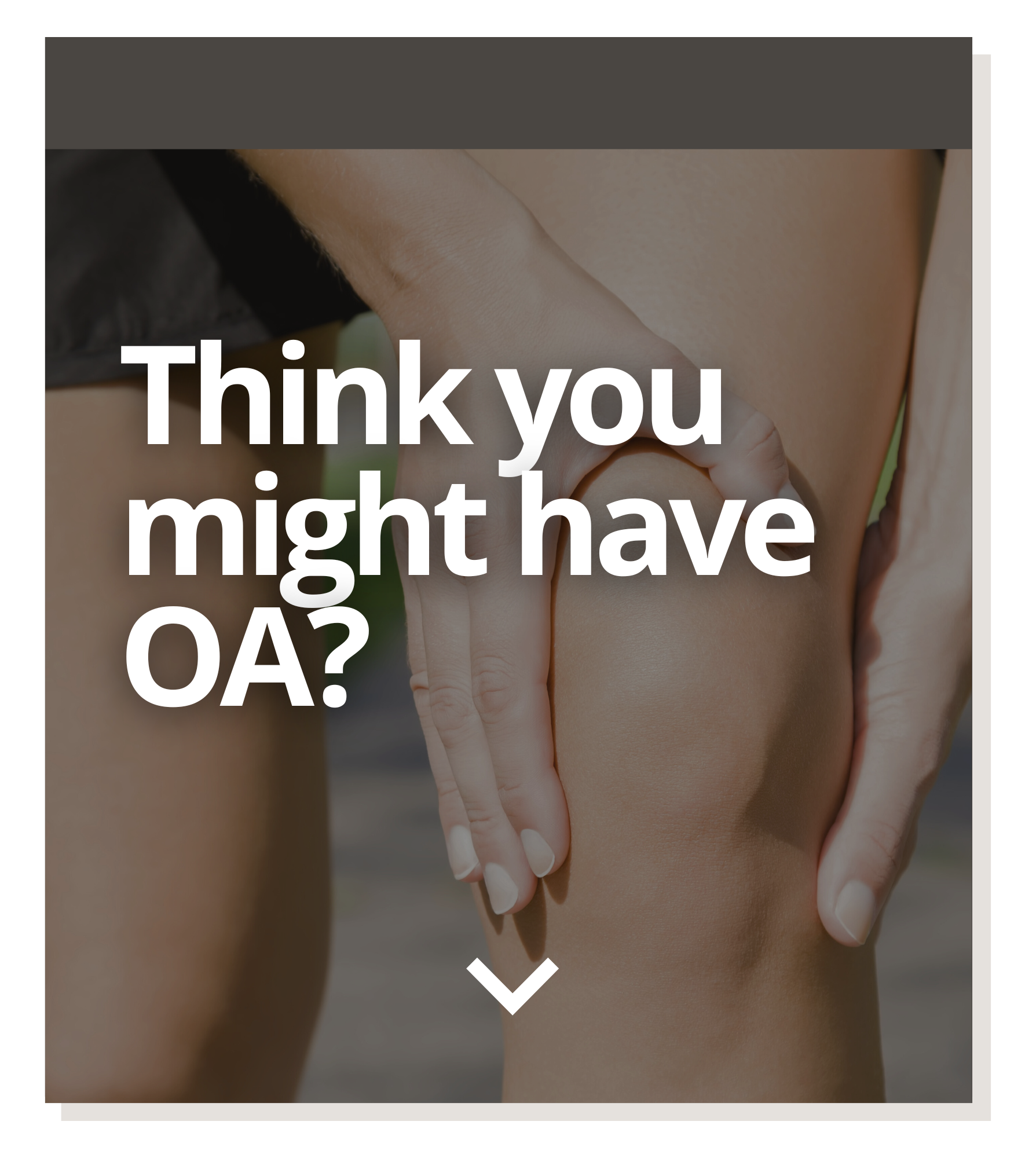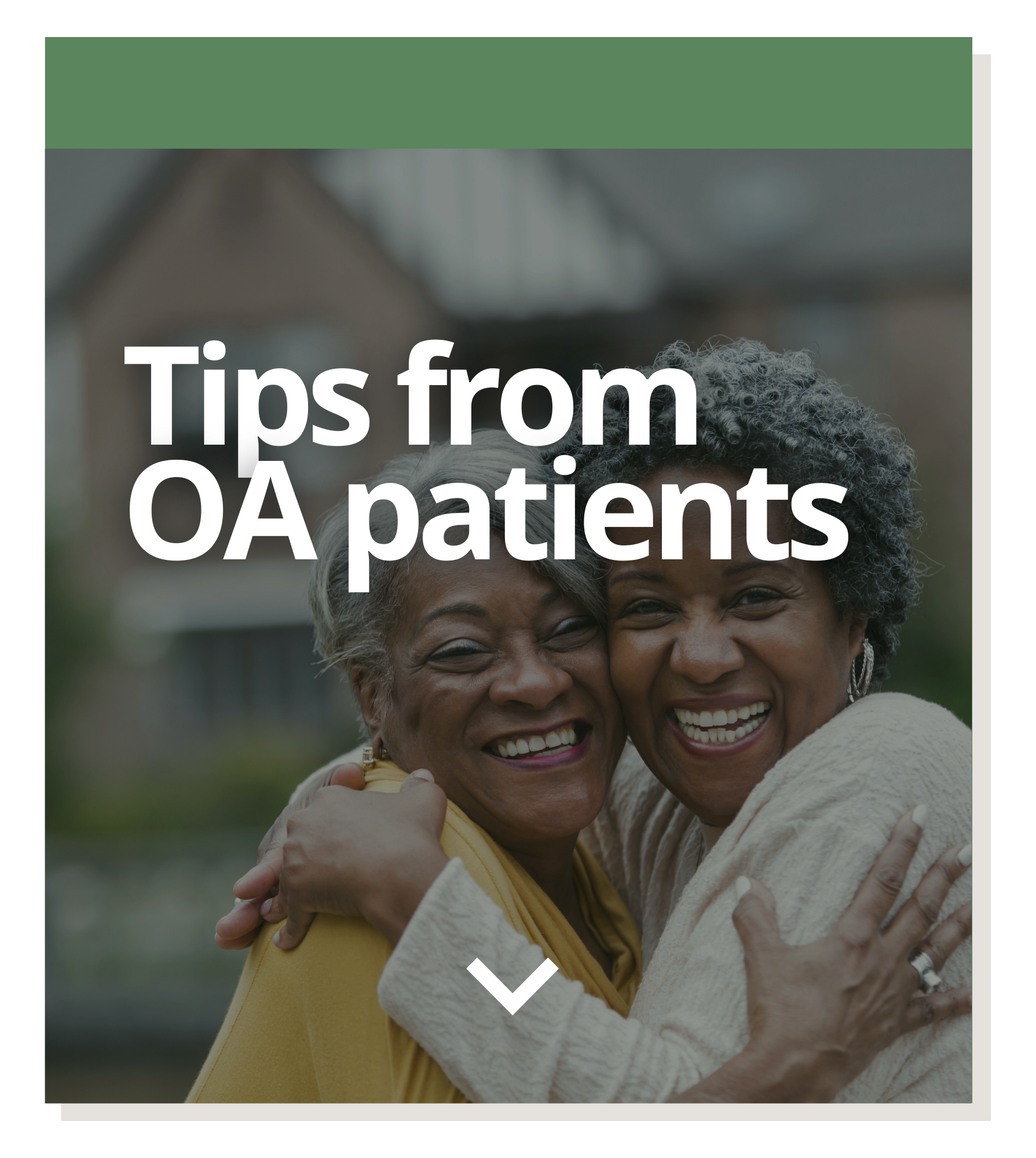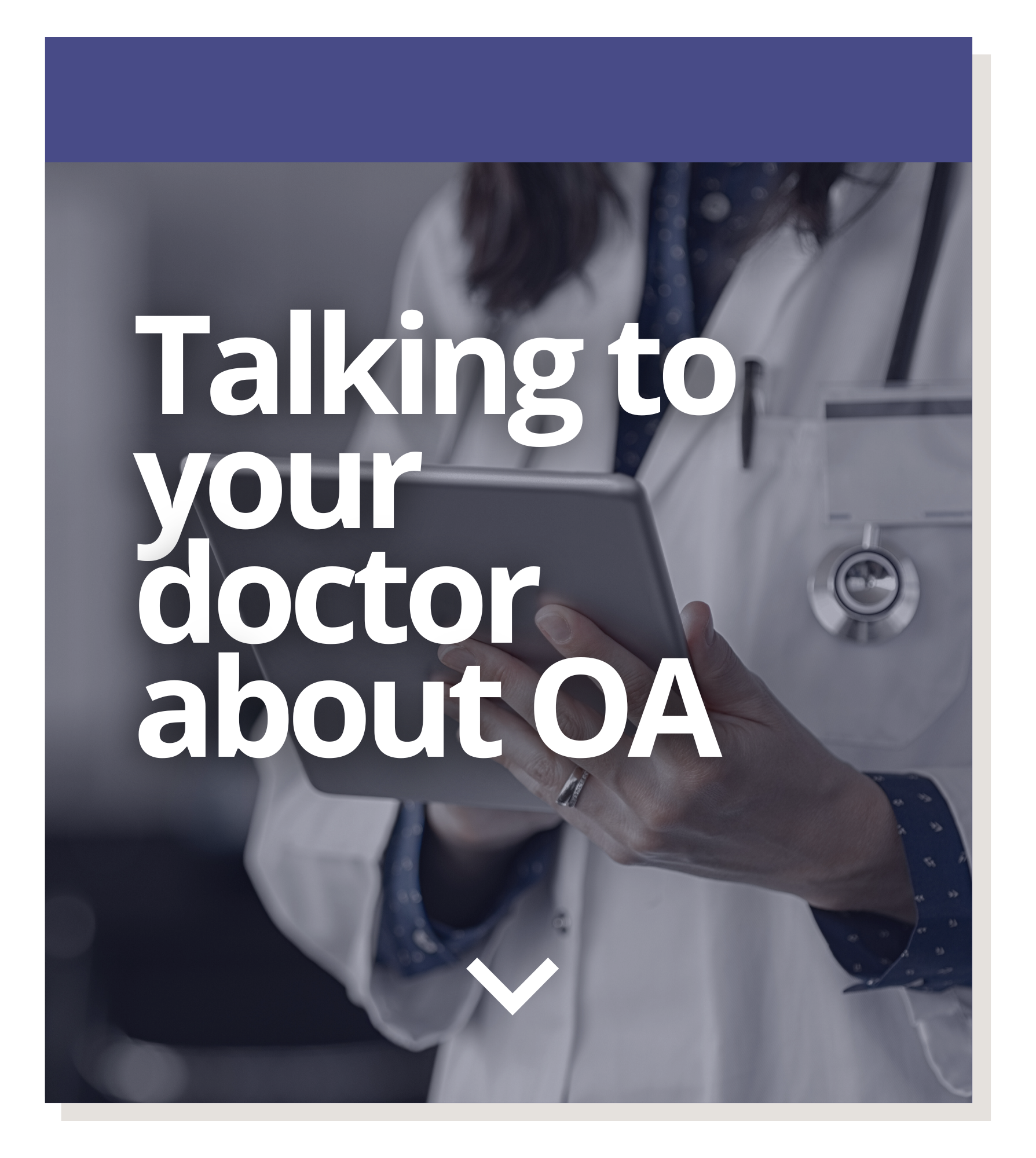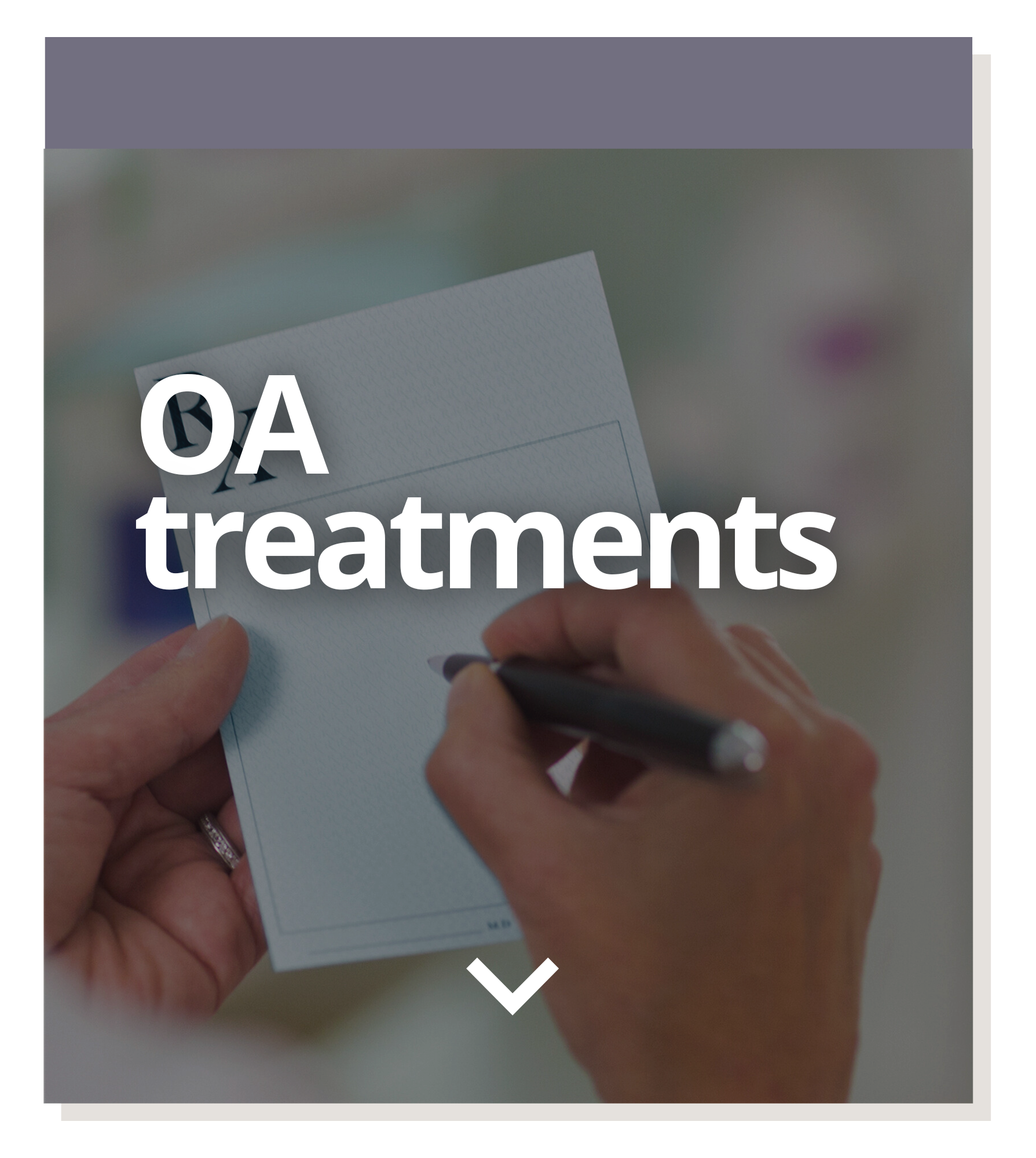
Where are you in your osteoarthritis treatment journey?
And where do you want to go next?
Use this free tool to guide you along the path toward a better life with knee osteoarthritis.
Welcome to OA Compass
Osteoarthritis (OA), also known as degenerative joint disease, is the most common form of arthritis and affects an estimated 360 million people globally.
The good news is that with the right resources and support you can live your best life.
This site is designed to help you or someone you love with knee pain and symptoms of OA better prepare for your next doctor’s visit. You decide where to start to learn more about managing knee osteoarthritis.
This free tool meets you where you are on your knee OA journey — whether you’re just beginning to experience symptoms, have recently been diagnosed, are managing daily life with OA, or are exploring available treatments.
Where will you go from here?





Think you might have OA?
Newly diagnosed with OA?
Tips from OA patients
Talking to your doctor about OA
OA treatments
What causes OA?
What are the symptoms of OA?
What are some tips from other patients living with OA?
What are the symptoms of OA?
Symptoms can include:
What causes OA?
Several factors contribute to this process, including:
Do other factors put me at risk for developing OA?
What are some tips from other patients living with OA?
Video: Advice from Patients for Anyone Newly Diagnosed with Knee Osteoarthritis
Watch this video to hear knee OA patients share valuable advice for people newly diagnosed with knee OA.
Think you might have OA?
Newly diagnosed with OA?
Tips from OA patients
Talking to your doctor about OA
OA treatments
When should I consult a doctor?
What questions should I ask my doctor?
How and why might I track my symptoms?
How and why might I track my symptoms?
What can I do to track my symptoms?
When should I consult a doctor?
Consult a doctor if you’re experiencing:
What questions should I ask my doctor?
OR you can use the questions below to guide your conversation about symptoms, treatment options, pain management, and lifestyle changes. And, remember, if possible bring a friendly or family member with you to take notes.
Questions to ask if you’re curious about:
The Basics of Knee OA
- What is knee osteoarthritis and what causes it?
- What stage of osteoarthritis do I have?
- What are the symptoms I should expect?
Getting Diagnosed
- What tests or imaging studies do I need to confirm my diagnosis?
- How will my condition likely progress over time?
OA Treatments
- What are my treatment options?
- What are the benefits and risks of each treatment?
Living with Knee OA
- What lifestyle changes can I make to help manage my symptoms?
- Are there specific exercises or activities I should avoid?
- What role does diet play in managing osteoarthritis, and are there specific foods that can help?
Managing Pain
- What are the best strategies for managing pain on a daily basis?
- Can alternative therapies like physical therapy, acupuncture or chiropractic care be helpful?
Monitoring Your OA
- What signs or symptoms should prompt me to contact you between visits?
- How can I monitor my condition at home?
What patients say about talking with your doctor:
Video: Trusting and Communicating with Your Doctor
Hear from patient advocate Beverly as she shares what it means to trust and communicate with your doctor, even when the conversations get tough.
Think you might have OA?
Newly diagnosed with OA?
Tips from OA patients
Talking to your doctor about OA
OA treatments
What are exercises I can do?
How does diet affect OA?
How might OA affect me emotionally or socially?
What are exercises I can do?
Here are a few tips to help you stay safe and active:
How to stay active with knee OA:
Video: Tips for Staying Active
Check out the video for more exercise tips to help you manage knee pain from osteoarthritis.
How does diet affect OA?
Here are a few tips to keep in mind:
How might OA affect me emotionally or socially?
Symptoms of depression to look out for:
Remember, it’s okay to seek help if you notice these symptoms.
You’re not alone, and there are resources and people ready to support you through this.
How do you stay motivated with OA?
Video: Deen Shares How OA Has Impacted Him Physically, Mentally, and Emotionally
Deen went from training for a triathlon to trying to figure out how to move without pain. In this video, he opens up about how this impacted his physical and mental health.
Think you might have OA?
Newly diagnosed with OA?
Tips from OA patients
Talking to your doctor about OA
OA treatments
What medications are prescribed for OA?
Should I consider surgery?
How can physical and occupational therapy help me?
What medications are prescribed for OA?
Medications are prescribed for OA aim to manage pain and inflammation. Common options include:
NSAIDs
NSAIDS are most commonly used when medications are needed to help treat OA. Non-steroidal anti-inflammatory drugs (NSAIDs) are medications (pills) that can help reduce inflammation, lessen your pain, and help you be more active. There are over-the-counter (OTC) NSAIDs that you can use without a prescription and prescription NSAIDs. They are not steroids, so are generally a safer class of drugs, but still can have side effects and interactions with other medications you may be using, so talk with your doctor to ensure NSAIDs are a safe and effective option for you.
Examples of OTC NSAIDs and pain relievers:
- Aspirin
- Ibuprofen (Advil)
- Naproxen (Aleve)
- Acetaminophen (Tylenol)
Examples of Prescription NSAIDs
- Celecoxib (Celebrex)
- Meloxicam (Mobic)
- Ketoprofen (Orudis KT)
What other types of prescription medications may help with pain relief?
- Duloxetine (Cymbalta, Drizalma, and Irenka)
- Tramadol (Ultram, Ultracet, and Ultram ER (extended release)
- Opioids
NOTE: You must consult with your health care team before considering any of these medications for the management of your arthritis.
Intra-articular (IA) Injections
When diet-and-exercise, physical therapy, activity modifications, and medications/supplements are insufficient for managing your OA pain, or when you have a bad “arthritis flare up,” you may want to talk to your doctor about joint (IA) injections. There are currently 3 major types of injections with strong scientific evidence for efficacy for treatment of OA: steroids, hyaluronic acid, and platelet rich plasma.
Here’s why you might consider them:
- These injections may quickly reduce pain and inflammation, giving you relief faster than some other treatments.
- IA injections are shots that your doctor gives directly into your knee joint. Because the medicine goes straight into your knee joint, it targets the problem area directly.
- By reducing pain and swelling, these injections may help you move your knee more easily and comfortably.
- The benefits from these injections can last for several weeks to months.
- If you prefer not to take pills every day, injections may be a good option to manage your pain.
Steroids
- Corticosteroid (steroid) injections can quickly help reduce inflammation, swelling, and pain, making it easier for you to move around and do your daily activities.
- The beneficial effects typically do not last more than a couple months, so steroid injections are best used for bad arthritis flare ups
- Steroid injections can have detrimental effects on your joint, especially after multiple times, and these injections may affect the timing of joint surgery should you need to choose that option for OA treatment.
- Most health insurance policies cover steroid injections.
Hyaluronic Acid (HA)
- HA is one of the two natural lubricants in your joint and can also reduce joint inflammation and pain.
- The beneficial effects of HA injections typically last 3 to 6 months, and injections can be repeated if effective.
- Most health insurance policies cover HA injections, but typically require pre-authorization.
Platelet Rich Plasma (PRP)
- PRP is an “orthobiologic” made from your own blood – it requires a blood draw followed by 5-15 minutes processing of the blood in a machine in the exam room you are in. Your PRP can then be injected into your knee as soon as it is ready.
- Your platelets in your PRP contain natural chemicals that reduce inflammation and pain, produce joint lubricants, encourage tissue repair, and slow down some of the disease processes of OA.
- The beneficial effects of PRP injections typically last 6 to 9 months, and injections can be repeated if effective.
- Only a few health insurance policies cover PRP injections at this time, and typically require pre-authorization.
NOTE: Stem cell” injections do not have strong scientific evidence for efficacy for treatment of OA at this time.
Supplements
Make sure that you tell your health care team about any and all supplements that you are taking for any reason as even OTC supplements can have severe side effects and interactions with medications.
- Capsaicin (Capzasin P, and Zostrix)
- Glucosamine and Chondroitin
- Undenatured or Hydrolyzed Collagen type II
- Fish oils
- Vitamins C, D and E
- Methylsulfonylmethane (MSM)
- S-Adenosyl-L-methionine (SAMe)
- Curcumin
- Avocado/Soybean Unsaponifiables (ASUs)
NOTE: Check consumerlab.com before choosing your supplement brand.
Should I consider surgery?
Other things to think about when considering surgery:
How can I….
Get ready to talk to my doctor about knee surgery
Consider these points when preparing to talk with your doctor about knee surgery:
- Shared decision-making: Discuss treatments you’ve tried and their effectiveness. This helps your doctor understand your unique situation.
- Previous treatments: Be ready to discuss past medications, physical therapy, or alternative treatments.
- Assessing fit for surgery: Consider your overall health, activity level, and the impact of knee issues on your quality of life.
- Bring support: Bring a trusted person to the appointment to help remember information and ask questions.
Have a conversation about knee surgery with my doctor
When discussing knee surgery with your physician, clear communication is key:
- Describe your problems: Clearly articulate your symptoms and limitations.
- Set goals and expectations: Explain what you hope to achieve from the treatment.
- State your purpose: Be clear if you’re seeking a diagnosis, discussing options, or scheduling surgery.
Remember what's important when thinking about knee surgery
Here are a few things to know about knee surgery:
- Individualized approach: Each patient’s situation is unique.
- Long-term commitment: Surgery requires rehabilitation and lifestyle changes.
- Alternative activities: Switching activities, like swimming instead of running, can delay surgery.
- Quality of Life: Consider how knee pain affects your daily life and happiness.
How can physical and occupational therapy help me?
Why exercise is important for knee osteoarthritis:
Exercise reduces pain, improves mobility, and maintains joint health. Medications alone often aren’t enough. Combine exercise with weight management, self-management programs, and arthritis education.
Regular exercise helps you:
How can I start exercising?
Before you start any exercise routine, it’s essential to consult your doctor.
Here are some tips to get started safely:
What types of exercise can I do?
Focus on low-impact activities that are easy on your joints.
Here are a few examples:
Try to integrate exercises into your everyday routines. Do some squats while picking up items or stretches while waiting for the microwave. While sitting at a desk, do leg lifts or ankle rotations to keep your joints moving.
Think you might have OA?
Newly diagnosed with OA?
Tips from OA patients
Talking to your doctor about OA
OA treatments
How can I prepare for an appointment?
How can I set goals with my doctor?
What questions should I ask my doctor?
How can I monitor my treatment progress?
How can I prepare for an appointment?
How do other OA patients start the conversation?
Video: Collaborating with Your Doctor About a Treatment Plan
In this video, several patients with knee OA share how they considered treatment options and worked jointly with their doctor.
How can I set goals with my doctor?
To prepare for your appointment, consider the following steps:
Here are some examples of goals you might set with your health care team:
I want to be able to…
What one doctor wants you to know about setting treatment goals:
Video: Dr. James Cook Discusses Personalized Decision-Making for Knee OA Surgery Timing and Options
Listen in as Dr. James Cook, Director of Operations and Research, Orthopaedic Surgery, discusses the importance of personalized decision-making in treating knee osteoarthritis.
What questions should I ask my doctor?
OR you can use the questions below to guide your conversation about symptoms, treatment options, pain management, and lifestyle changes. And, remember, if possible bring a friendly or family member with you to take notes.
Questions to ask if you’re curious about:
The Basics of Knee OA
- What is knee osteoarthritis and what causes it?
- What stage of osteoarthritis do I have?
- What are the symptoms I should expect?
Getting Diagnosed
- What tests or imaging studies do I need to confirm my diagnosis?
- How will my condition likely progress over time?
OA Treatments
- What are my treatment options?
- What are the benefits and risks of each treatment?
Living with Knee OA
- What lifestyle changes can I make to help manage my symptoms?
- Are there specific exercises or activities I should avoid?
- What role does diet play in managing osteoarthritis, and are there specific foods that can help?
Managing Pain
- What are the best strategies for managing pain on a daily basis?
- Can alternative therapies like physical therapy, acupuncture, or chiropractic care be helpful?
Monitoring Your OA
- What signs or symptoms should prompt me to contact you between visits?
- How can I monitor my condition at home?
How can I monitor my treatment progress?
If you’re about to start a new medication, here are some questions you may want to ask your doctor:
What patients say about tracking knee pain:

Get the free complete knee OA toolkit and more advice on managing your knee osteoarthritis — delivered right to your inbox!
Are you ready to take the next step on your OA journey?
By signing up you will receive:
- A note-taking guide to help you prepare for your next doctor’s appointment
- A list of helpful questions to ask your doctor
- A one-page overview of OA to consult during your appointment
By clicking Submit, you agree to receive emails from GHLF. We will never sell your data.
The information contained on the Global Healthy Living Foundation (GHLF) website is provided for general information purposes only. GHLF does not give medical advice or engage in the practice of medicine. The organization under no circumstances recommends any particular treatment for specific individuals and in all cases recommends that you consult your physician before pursuing any course of treatment. This recommendation stands for pharmacological and non- pharmacological treatment considerations.
This project was made possible with support from Averitas.



